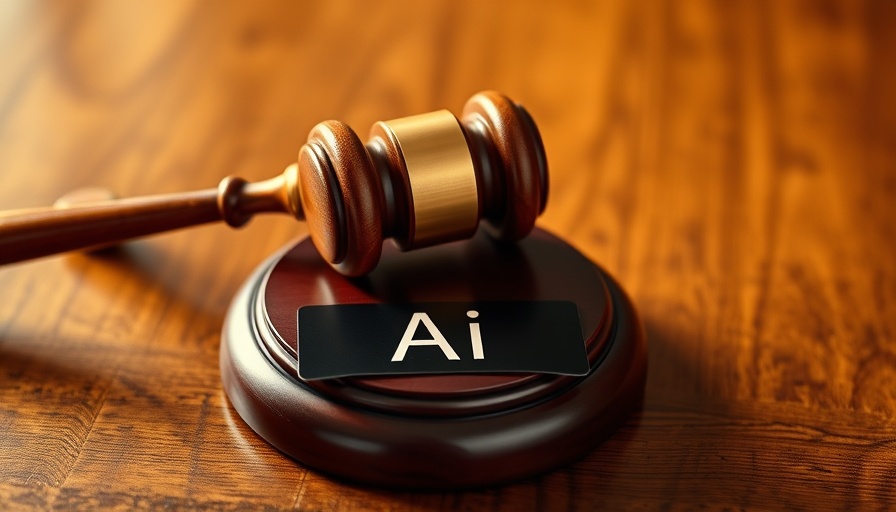
The Rise of AI in Legal Work: A Double-Edged Sword
The integration of artificial intelligence (AI) into the legal profession presents both opportunities and challenges. While AI tools offer efficiencies in legal research, as noted by Judge Victoria Sharp of the High Court of England and Wales, the potential for misuse looms large. The past few years have seen a rapid advancement in these technologies, raising questions about their reliability. AI tools like ChatGPT may produce coherent responses; however, their outputs are not consistently accurate, significantly impacting the integrity of legal processes.
Understanding the Severity of Misuse in Legal Contexts
Judge Sharp's ruling highlights a critical concern within the legal community. Lawyers who fail to verify AI-generated citations may face severe penalties, a warning that reflects a growing awareness of the consequences of reliance on flawed technologies. In the cases cited, attorneys misrepresented their research, leading to incorrect citations that undermined their cases. The High Court's emphasis on maintaining professional integrity cannot be overstated, reminding lawyers that their duties to the court and to their clients depend on accuracy and truthfulness.
The Human Element: Trust, Ethics, and AI
For parents of school-aged children entering an increasingly tech-driven world, understanding the ethical implications of AI becomes pertinent. If legal professionals—who are supposed to uphold a system of justice—fail in their responsibilities due to negligence in handling AI-generated resources, what does that say about the future of various industries? These questions are essential in shaping a conversation about ethical standards in technology. Raising awareness of AI's limitations and the importance of due diligence in professions will allow young individuals to grow with an understanding of accountability in their future careers.
What Lies Ahead: Future Trends in AI and Legal Practices
As AI technology evolves, we're likely to see increasing scrutiny within the legal profession regarding its application. The dynamics of legal work are changing; firms must foster a culture of compliance to avoid penalties and safeguard their credibility. Educational initiatives targeting legal professionals will be essential, guiding attorneys on how to responsibly use AI while reinforcing their obligations. This could be a crucial lesson for the next generation, preparing future lawyers to harness AI technology without compromising their ethical standards.
Steps for Lawyers: Best Practices to Avoid Misuse
To steer clear of the potential pitfalls evoked by careless AI usage, lawyers can adopt several best practices. First, they should establish a methodical approach to double-check AI-generated citations against authoritative sources. This not only helps maintain accuracy but also reinforces their professional integrity. Secondly, regular training sessions focusing on AI advancements and legal implications can keep lawyers informed and ready to tackle challenges effectively. These proactive measures can mitigate risks and ensure that the legal profession evolves alongside technology.
Fostering Transparency: The Role of Regulatory Bodies
Regulatory bodies like the Bar Council and the Law Society must play a pivotal role in developing guidelines for ethical AI use in legal contexts. By providing clear frameworks and update trainings, they can ensure that legal professionals are not just aware of the potential consequences of AI misuse, but also equipped with tools to navigate it. The future of law will depend on a commitment to transparency and integrity, both in the courtroom and in the practice of integrating AI into legal work.
Conclusion: Responsibly Integrating AI for a Safer Future
The message from the High Court is clear: while AI can enhance legal research, it remains the responsibility of attorneys to ensure the accuracy of their citations. As innovations continue to disrupt traditional practices, it is imperative for the next generation of legal minds to understand both the benefits and drawbacks of such technologies. By fostering a culture of responsibility and diligence, we can harness the power of AI while safeguarding the essential values that underlie our legal systems.
As a parent, take this opportunity to discuss with your children the importance of ethical practices in any profession they may choose. It’s vital they not only understand the technology itself but also the principles of accountability that come with it.
 Add Row
Add Row  Add
Add 




 Add Row
Add Row  Add
Add 

Write A Comment